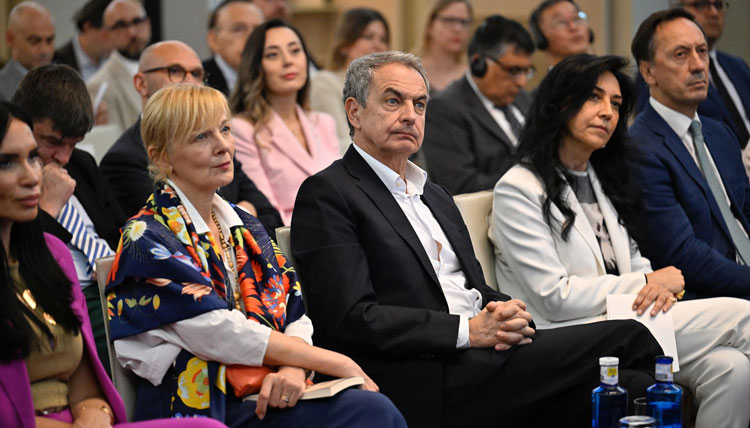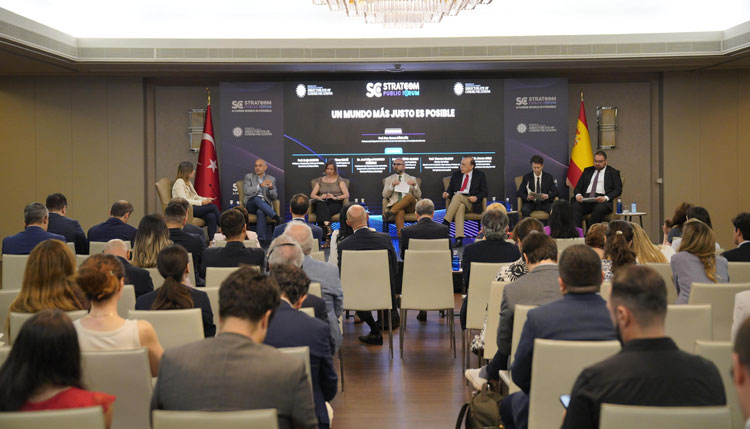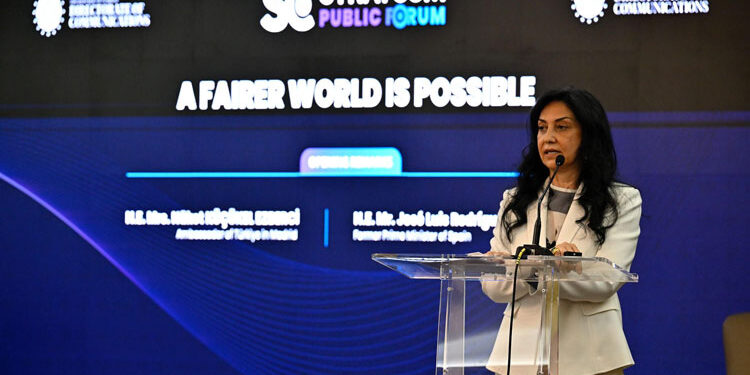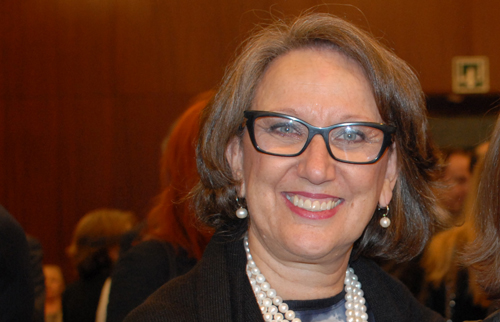The Diplomat
As part of the Stratcom Public Forum held in Madrid last Friday, the Turkish Embassy organized a panel entitled A fairer world is possible. The panel addressed issues in global governance, crises of the international system and the role of international institutions in building a fair, sustainable and equitable system.
The panel, which highlighted the problems of the current international system and stressed the need for a more inclusive, equitable, transparent, sustainable and just world order, was attended by numerous diplomats, bureaucrats, politicians, academics, journalists and students.
The programme began with the screening of a thematic video on the “Stratcom Public Forum” and continued with the reading of a special message sent by the Chairman of the Directorate for Communications, Prof. Dr. Fahrettin Altun.
The opening session was conducted by the Ambassador of Turkey, Nüket Küçükel Ezberci, and the former Prime Minister of Spain, José Luis Rodríguez Zapatero, followed by the panel session.
The Ambassador noted that the panel provided an important platform to discuss critical issues such as multilateralism and reform of international institutions. He stressed that “the international system is under pressure due to growing geopolitical tensions, economic instability, racism, islamophobia and hate speech”. He also noted that “the current structure of the UN Security Council does not reflect the realities of today’s world”, and that the Council has “been ineffective in dealing with the humanitarian crisis in Palestine”. He reaffirmed Turkey’s strong position in favour of “a fairer, more inclusive and effective global governance”, and said that President Erdoğan’s motto “The world is bigger than five” constitutes “the basis for this vision”.
In his speech, the former Prime Minister of Spain, José Luis Rodríguez Zapatero, underlined the complexity of global transformations and how some countries act as both actors and sources of crises. He pointed out that “the anti-European discourse of the United States and the influence of the extreme right threaten the course of Europe”. He said that “Europe must defend its historical values by promoting democracy, peace and justice”, that “closer Turkey to the EU could help prevent conflicts such as those in Ukraine and the conflict between Israel and Palestine” and stressed that “what is happening in Gaza constitutes a violation of fundamental human rights” and that this “can only be overcome by strong political leadership and intellectual awakening”. He said that “despite the increase in NATO spending, Europe’s influence on global security remains limited, creating more insecurity”. Finally, former president Zapatero stressed “the need for a structural reform of the UN Security Council” and stated that “to achieve a more just world, we need the language of peace, not war”.
In the session moderated by Prof. Dr. Gonca Oğuz Gök, from Marmara University, Prof. Dr. Borja Santos, from IE School of Politics, Economics and Global Affairs, noted the interconnected nature of global crises and stressed “the need for a more innovative and inclusive UN system”. He noted that “civil society plays a crucial role in global governance by representing the voice of discriminated individuals”.
Dr. Iliana Olivié, of the Real Instituto Elcano, stressed that “climate, security and food crises are structurally interrelated”. He stressed the importance of correctly identifying the causes and those responsible for these crises and stated that “reform of the UN Security Council has become inevitable. This reform must prioritize not only representation, but also justice and equality”.
For his part, Dr. José Miguel Calvillo Cisneros, Professor and Vice-Dean of the Department of International Relations at the Universidad Complutense de Madrid, pointed out that “the current system of global governance is insufficient in the face of today’s multiple interconnected crises.” He noted that “the representative structure of the UN Security Council does not respond to contemporary needs”, and stressed the importance of including countries such as Turkey, Brazil, India and South Africa in decision-making processes. In addition, he called for “greater political and financial independence of the UN so that it can function more effectively”.
Augusto López-Claros, Executive Director and Chairman of the Global Governance Forum and international economist, noted that “The current international institutions were designed for a post-1945 world, but they can no longer respond to today’s threats such as the climate crisis, economic instability and growing security risks”. He stated that “the UN must evolve towards a more representative and inclusive structure without losing its core values” and proposed as a solution “the creation of a ‘Council of the World System’ and a stronger Human Rights Council”.
Prof. Dr. Vicente Palacio, Professor of the Department of International Relations at the Complutense University of Madrid and Director of the Foreign Policy Observatory (OPEX), indicated that in “the core of the global governance crisis is the failure to uphold the responsibility to protect democracy”. He highlighted the power of the media to influence international public opinion through their testimony on the wars and criticized “the obstacles imposed by Israel on humanitarian aid to Gaza”. He advocated funding global diplomacy and said that “Spanish-Turkish cooperation in the use of artificial intelligence for the benefit of humanity is promising”.
Finally, Prof. Dr. Erman Akıllı of the Hacı Bayram Veli University in Ankara stressed that despite the mission of the UN system to ensure international peace and security, “there is a crisis of representation and legitimacy”. He stated that President Erdoğan’s expression The world is bigger than five “represents an important warning against this structural problem”. He indicated that “a more fair and participatory model of governance must be built which also integrates countries outside the major powers into decision-making processes”.









